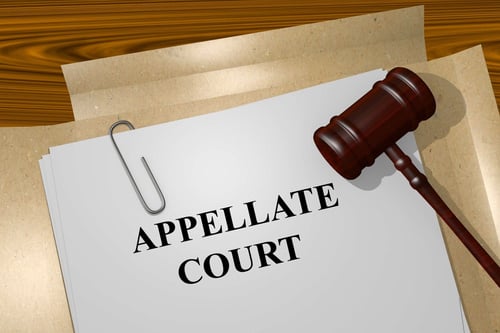
Does The State Need A Certificate Of Appealability To Appeal A Habeas Judgement?
18
Does The State Need A Certificate Of Appealability To Appeal A Habeas Judgement?
 Anyone who’s handled a habeas appeal in the federal court system knows you have to obtain a certificate of appealability before appealing a district court’s denial of habeas relief. If the district court denies the request for a certificate of appealability, you have to ask the federal appellate court. No controversy there.
Anyone who’s handled a habeas appeal in the federal court system knows you have to obtain a certificate of appealability before appealing a district court’s denial of habeas relief. If the district court denies the request for a certificate of appealability, you have to ask the federal appellate court. No controversy there.
The more interesting question, however, is whether a state is required to obtain a certificate of appealability before appealing a district court’s grant of habeas relief to the petitioner.
28 U.S.C. § 2253 – Appeal
28 U.S.C. § 2253(c)(1) provides: “Unless a circuit justice or judge issues a certificate of appealability, an appeal may not be taken to the court of appeals from–(A) the final order in a habeas corpus proceeding in which the detention complained of arises out of process issued by a State court; or (B) the final order in a proceeding under section 2255.”
Nowhere in this provision is there a suggestion that the requirement of obtaining a Certificate of Appealability applies only to prisoners appealing denials of habeas petitions. Also absent from the language of the statute is any suggestion that Congress intended to excuse states or the federal government when appealing a district court’s grant of habeas relief to a prisoner. To the contrary, the language is stated in general terms, applicable to “an appeal” from a “final order in a habeas corpus proceeding.”
On the other hand, Rule 22(b)(3) of the Federal Rules of Appellate Procedure specifically exempts states and their representatives, as well as the federal government, from the Certificate of Appealability requirement. Thus, the question is, does Rule 22(b)(3) trump section 2253(c)(1), or vice versa?
28 U.S.C. § 2072 – Rules of Procedure and Evidence
Under 28 U.S.C. § 2072 (“The Rules Enabling Act”), the United States Supreme Court is authorized to “prescribe general rules of practice and procedure and rules of evidence for cases” in district and appellate federal courts. 28 U.S.C. § 2072(a). Moreover, the Rules Enabling Act provides that all “laws in conflict with such rules shall be of no further force or effect after such rules have taken effect.” 28 U.S.C. § 2072(b). Thus, at first blush, it would seem the answer is clear: Rule 22(b)(3) trumps 2253(c)(1).
Not so fast. The Rules Enabling Act also provides that such “rules shall not abridge, enlarge or modify any substantive right.” 28 U.S.C. § 2072(b). And in Willy v. Coastal Corp., 503 U.S. 131 (1992), the Supreme Court held that “federal courts, in adopting rules, [are] not free to extend or restrict the jurisdiction conferred by a statute.” Willy, 503 U.S. at 135 (citing Sibbach v. Wilson & Co., 312 U.S. 1 (1941)). The Willy Court explained further that such “a caveat applies a fortiori to any effort to extend by rule the judicial power of the United States described in Article III of the Constitution. The Rules, then, must be deemed to apply only if their application will not impermissibly expand the judicial authority conferred by Article III.” Id.
Thus, the Supreme Court has made clear that the general rule established in The Rules Enabling Act that a federal rule of procedure trumps a statute does not apply if the rule purports to expand or restrict federal jurisdiction. The issue here is that Rule 22(b)(3) appears to expand the limitation on appellate jurisdiction over federal habeas appeals provided in section 2253(c)(1).
Restricting Federal Appellate Jurisdiction Over Habeas Appeals
After the Supreme Court’s decision in Gonzalez v. Thaler, there is no doubt section 2253(c)(1) acts to restrict federal appellate jurisdiction over habeas appeals:
We accordingly have applied the following principle: A rule is jurisdictional “[i]f the Legislature clearly states that a threshold limitation on a statute’s scope shall count as jurisdictional.” Arbaugh v. Y & H Corp., 546 U.S. 500, 515, 126 S.Ct. 1235, 163 L.Ed.2d 1097 (2006). But if “Congress does not rank a statutory limitation on coverage as jurisdictional, courts should treat the restriction as nonjurisdictional.” Id., at 516, 126 S.Ct. 1235.3 That clear-statement principle makes particular sense in this statute, as we consider—against the backdrop of § 2253(a)’s clear jurisdictional grant to the courts of appeals and § 2253(b)’s clear limit on that grant—the extent to which Congress intended the COA process outlined in § 2253(c) to further limit the courts of appeals’ jurisdiction over habeas appeals.
Here, the only “clear” jurisdictional language in § 2253(c) appears in § 2253(c)(1). As we explained in Miller–El v. Cockrell, 537 U.S. 322, 123 S.Ct. 1029, 154 L.Ed.2d 931 (2003), § 2253(c)(1)’s plain terms—“Unless a circuit justice or judge issues a certificate of appealability, an appeal may not be taken to the court of appeals”—establish that “until a COA has been issued federal courts of appeals lack jurisdiction to rule on the merits of appeals from habeas petitioners.” Id., at 336, 123 S.Ct. 1029.
Gonzalez v. Thaler, 132 S. Ct. 641, 649 (2012).
In sum, as Thaler makes clear, section 2253(c)(1) is a statutory provision expressly designed to limit federal appellate jurisdiction over habeas appeals. The plain language of section 2253(c)(1) does not differentiate between appeals by the state and appeals by prisoners – the jurisdictional limitation applies to appeals generally over all final orders in habeas proceedings. Against that backdrop, it is difficult to view Rule 22(b)(3) as anything other than a rule that “extend[s]” the “jurisdiction conferred by a statute.” Willy, 503 U.S. at 135.
Absence of Case Law
Predictably, there seems to be no case law addressing this issue head-on. Thaler is a relatively recent decision and federal habeas relief is rarely granted. See, e.g., Margaret A. Upshaw, The Unappealing State of Certificates of Appealability, 82 U. Chi. L. Rev. 1609, 1658 (2015) (citing Nancy J. King, Non-capital Habeas Cases after Appellate Review: An Empirical Analysis, 24 Fed. Sent. Rptr. 308, 310 (2012) (observing that, after both district and circuit court review, habeas relief was granted in only 0.8 percent of noncapital habeas cases).
In sum, there is a legitimate argument that a state should be required to obtain a certificate of appealability before appealing a habeas judgment in the petitioner’s favor. A federal appellate court should resolve the conflict between Rule 22(b)(3) and section 2253(c)(1), and find that unless and until a state obtains a Certificate of Appealability, the federal appellate court lacks subject matter jurisdiction over a state’s appeal of a habeas judgment in favor of the petitioner.
Contact The Brownlee Law Firm
The Brownlee Law Firm only handles appeals and as a board-certified appellate attorney, Michael Brownlee has the experience and expertise to effectively handle your appeal case, particularly those in habeas proceedings. Contact The Brownlee Law Firm today for your FREE consultation.




